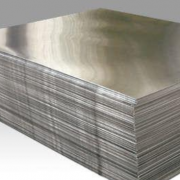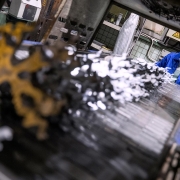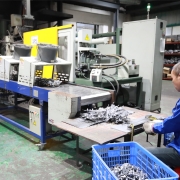CNC Machining Materials: Choosing the Right Materials for CNC Machining Project
CNC machining is inarguably the lifeblood of the manufacturing industry with applications such as aerospace, medical devices, and electronics. In recent years, there have been incredible advancements in the field of CNC machining materials. Their wide portfolio now offers great combinations of material properties, cost, and aesthetics.
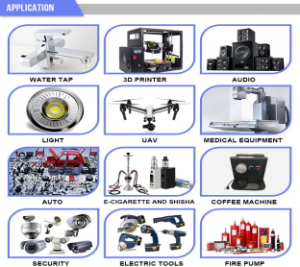
In this article, we will take a deep dive into the diversity of CNC materials. We will provide you with a comprehensive guide to selecting the right materials for CNC machining, including a detailed list of commonly used materials.
1.How to Choose the Best CNC Machining Material
Engineers are free to choose the best CNC material for their specific needs. Choosing the right material depends on several factors such as required strength, durability, surface finish and cost-effectiveness. Therefore, when selecting a CNC material, you must consider various factors to help you make an informed decision and ensure the success of your project.
Machining Environment
It is important to consider the machining environment when choosing CNC materials. Because different materials react differently to different machining conditions, such as cutting speed, tool material, and coolant. The machining environment includes factors such as temperature, humidity, and the presence of contaminants. Therefore, taking into account the machining environment can help improve productivity, reduce costs, and ensure the quality of the finished product.
Part Weight
It is essential to consider part weight to ensure cost-effectiveness, performance, and manufacturability. Heavier parts require more material, which can increase the cost of production. Additionally, heavier parts may require larger and more powerful CNC machines to manufacture, which increases costs and production time. Therefore, choosing a material with a lower density, such as aluminum or magnesium, can help reduce the weight of the part and lower production costs.
Heat Resistance
Heat resistance directly impacts the material’s ability to withstand high temperatures without experiencing significant deformation or damage. During CNC machining process, the material being machined undergoes various heating and cooling cycles, particularly when it is being cut, drilled, or milled. These cycles can cause thermal expansion, warping, or cracking in materials that are not heat resistant.
Choosing CNC materials with good heat resistance can also help improve the machining process and reduce production costs. When a material can withstand high temperatures, it allows for faster cutting speeds and deeper cuts. This brings shorter machining times and reduced wear on tools.
Electrical Conductivity and Magnetic Requirements
In CNC machining, materials with high electrical conductivity are preferred because they can dissipate heat effectively. The heat generated during the process can cause the material to warp or deform. Materials with high electrical conductivity, such as copper and aluminum, can effectively dissipate heat, which helps to prevent these issues.
Magnetic properties are also important when choosing CNC materials.The materials have a strong magnetic field can affect the cutting process. Materials that are non-magnetic are preferred for CNC machining because they are not affected by the magnetic field and therefore produce a cleaner cut.
Hardness
When a CNC material is too hard, it can be difficult to cut or shape, which can result in excessive tool wear, tool breakage, or poor surface finish. Conversely, a material that is too soft may deform or deflect under the cutting force, resulting in poor dimensional accuracy or surface finish. Therefore, choosing a material for CNC machining with appropriate hardness is critical for achieving high-quality, precision machined components.
Surface Finish
The surface finish affects the final machined product’s performance and appearance. For example, a part with a rough surface finish may experience more friction, which can lead to premature wear and failure. On the other hand, a part with a smooth surface finish will have less friction, resulting in improved performance and a longer lifespan. Additionally, the surface finish also plays a significant role in the aesthetics. A polished surface finish can improve the appearance of a part and make it more appealing to customers.
- Aesthetics
If your CNC machining project is intended to produce a product that will be used in a high-end retail setting, aesthetics would be a significant factor. The material must be visually appealing, with an attractive texture, color, and surface finish. It should also be capable of being easily polished, painted, or finished to achieve a desired look.
- Application
The final application of the product is the ultimate decision-maker. The aforementioned factors make up a small portion of all the reasons one considers before finalizing a CNC material. Other application-driven factors can include practical concerns like material machinability, chemical reactivity, adhesiveness, material availability, fatigue life, etc.
- Budget
Budget is an important factor to consider for several reasons. The material’s cost can significantly vary depending on the type and quantity required. While some high-grade metals may be costly, plastics or composites can be more affordable. Setting a budget for materials will help narrow down your options and focus on materials within your price range.
2.The Best Materials for CNC Machining Projects
Now, let us move on to the next part of our discussion: types of CNC machining materials. We will discuss in detail the regular metals and plastics. Later, we will shift our focus to some less well-known CNC materials.
1. Metal CNC Materials
Metals are the most common material among CNC machined parts. They offer a wide range of favorable properties such as high strength, hardness, thermal resistance, and electrical conductivity.
Aluminum (6061, 7075)
Aluminum is widely considered to be one of the most versatile and valuable materials in CNC machining. It has an exceptional strength-to-weight ratio, lightweight nature, corrosion resistance, and striking silvery appearance,and easy to machine,which makes it a popular choice for manufacturers. The high-quality 6061 and 7075 grades of aluminum are particularly popular for use in aerospace frames, automotive engine parts, and lightweight sporting equipment.
Stainless Steel (316, 303, 304)
Stainless steel comes in numerous grades. Generally, though, it possesses high strength and toughness, wear resistance, and corrosion resistance, and has a shiny appearance like aluminum. Furthermore, it is among the mid-priced metals. However, it is a hard-to-machine CNC material due to its hardness.
l Carbon Steel and Alloy Steel
Carbon steel and related alloys offer excellent strength and machinability, making them ideal for use in many applications. They are also compatible with various heat treatment processes, further enhancing their mechanical properties. Moreover, carbon steel is relatively inexpensive compared to other CNC metals.
Brass
Brass is a versatile metal known for its excellent machinability, corrosion resistance, and thermal and electrical conductivity. It also boasts an attractive appearance thanks to its copper content, as well as excellent surface friction properties.
Brass finds numerous applications in various industries. For instance, it is commonly used in consumer products, low-strength fasteners, plumbing, and electrical devices. Its properties make it an ideal choice for manufacturing components that require durability and strength while retaining an aesthetic appeal.
Copper
Copper is renowned for its excellent electrical and thermal conductivity. However, it can be challenging to machine due to its high malleability. This can cause difficulties in generating chips during CNC machining. In addition, copper is prone to corrosion, which can be a concern in certain environments.
Titanium
Titanium alloys are known for their exceptional strength-to-weight ratios, making them lightweight and strong simultaneously. They are also corrosion-resistant and have good heat conductivity. Additionally, titanium is biocompatible, so they are suitable for biomedical applications.
Magnesium
Magnesium is a metal that combines strength with a low weight. Its excellent thermal properties make it ideal for use in high-temperature environments, such as in engines. Its lightweight nature allows for the production of lighter and more fuel-efficient vehicles. However, magnesium is also known for its flammability, which can make it a safety concern in certain applications. Additionally, it is not as corrosion-resistant as some other metals, such as aluminum, and can be more expensive to machine.
2.Plastic CNC Materials
We’ll now discuss CNC plastics. Although most plastic materials are not machinable due to their low rigidity and melting points, we have picked out the small group that has wide-ranging CNC applications.
- Acetal (POM)
Acetal is a highly versatile CNC plastic with a range of desirable properties. It boasts excellent fatigue and impact resistance, decent toughness, and low friction coefficients. Besides, it is highly resistant to moisture, which makes it an excellent choice for use in damp environments.
- Acrylic (PMMA)
Acrylic is a commonly used material that can serve as a substitute for glass due to its desirable properties. It has good rigidity and optical clarity, allowing it to be used in applications where see-through surfaces are necessary. Acrylic components offer an attractive and functional alternative to glass, with good optical clarity and a high degree of durability.
- Polycarbonate (PC)
Polycarbonate (PC) is a popular plastic material used for CNC machining due to its unique set of properties. It is highly transparent, making it an ideal material for use in products that require clarity, such as safety glasses, medical equipment, and electronic displays. Moreover, it has good heat resistance so it’s suitable for use in high-temperature applications.
- Polypropylene (PP)
Polypropylene is a versatile polymer with numerous benefits, including high chemical resistance and fatigue strength. It is also a medical-grade material, and it produces a smooth surface finish when CNC machining. However, one of its limitations is that it cannot withstand high temperatures, as it tends to soften and gall during cutting, which makes it slightly challenging to machine.
- ABS
ABS is a highly cost-effective plastic material that is well-suited for CNC machining due to its excellent machinability, tensile strength, impact resistance, and chemical resistance. Moreover, it can be easily colored, making it ideal for applications where aesthetics are important. However, ABS is not suitable for use in high-heat environments and is non-biodegradable. Besides, it produces an unpleasant fume when burned, which can be a concern in a CNC shop.
- Nylon
Nylon is a versatile material with excellent tensile strength, hardness, and impact resistance. It can be used in a variety of composite forms, such as glass-fiber-reinforced nylon, and has superb surface lubrication capabilities. However, it is not recommended for use in moist environments.
- UHMW-PE
UHMWPE is a popular material due to its exceptional properties, including high hardness, abrasion and wear resistance and durability. However, its thermal instability during machining makes it challenging to machine.
3.Other Materials
CNC machining commonly uses metals and plastics, but it can also work with many other materials, including those listed below.
Foam
Foams are a type of CNC material that are characterized by a solid body with air-filled voids. This unique structure gives foams a recognizable shape and remarkable lightness. Certain high-density foams, such as polyurethane foam and Styrofoam, can be easily machined due to their rigidity, strength, lightweight, and durability.
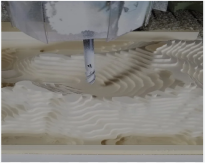
Wood
Wood is a widely used material for CNC machining due to its ease of machining, good strength and hardness, and wide range of available types. In addition, wood is an organic compound and has no negative impact on the environment. Due to its versatility and aesthetic appeal, wood is a popular choice for furniture, home decor, and DIY projects. However, wood machining generates a large amount of dust, which can pose health risks to workers. Therefore, it’s important for wood machining workshops to have proper swarf management systems in place.
Composites
Composites are materials made up of two or more constituents that are joined together with a bonding medium. Common composite materials used in CNC machining include carbon fiber, plywood, fiberglass, and others. These materials have applications in diverse industries, such as automotive, aviation, sports, and medical.
As material science has advanced, CNC machining has become increasingly reliant on thoughtful materials selection. At Selection Hardware, we specialize in CNC machining services, including CNC milling and turning, and offer an extensive range of materials, from sought-after metals to high-quality plastics. We have rich experience and a professional team, so we have the ability to provide customers with high-precision and high-quality CNC hardware products.

